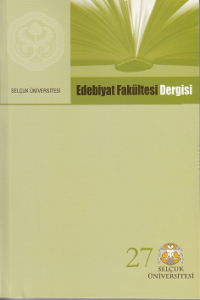Öz
Toplumsal yaşamda meydana gelen değişimlerin etkisi bir çok alanda olduğu gibi dilde de
görülür. Bunun sonucunda ortaya çıkan yeni kavramları adlandırmak için önceden dilde olmayan
sözcükler ve deyimler oluşur. Toplumsal gereksinimler temelinde biçimlenen bu süreç tamamen tersine
de işleyebilir. Diğer bir deyişle çeşitli dil varlıkları zamanla işlevini kaybederek kullanımdan çıkabilir.
Dilde yeni sözcük ve deyimlerin oluşmasında en verimli kaynaklardan biri de edebi eserlerdir. Yazar
veya şair tarafından yaratılan sözcük ve deyimler zamanla sloganlaşarak dile yerleşirler. Rusçada ilk kez
Nikolay Gerasimoviç Pomyalovskiy’in Meşçanskoe sçast'ye ‘Küçük Burjuva Mutluluğu’ (1861) adlı
öyküsünde görülen ve daha sonra deyimleşerek Rusçaya yerleşen kiseynaya barışnya ‘nazlı kız’ ifadesi
de bu çerçevede değerlendirilebilir. Bu deyim önceleri 19. yy. Rusyasında toprak köleliği sistemine
dayalı sosyoekonomik düzende “küçük burjuva bakış açısına göre yetişmiş, yaşama uyum
sağlayamamış nazlı kız” anlamında kullanılmıştır. 20. yy.’ın başında Rusya’da meydana gelen
ekonomik, toplumsal ve siyasal değişimler sonucunda ise “yaşama uyum sağlayamamış, nazlı
büyütülmüş kişi” anlamında hem kadınlar hem de erkekler için kullanılmaya başlamıştır. Bu çalışmada
kiseynaya barışnya ifadesiyle sembolleşen kadın imajı Meşçanskoe sçast'ye öyküsü temelinde, dil ve
kültür açısından incelenecektir.
Anahtar Kelimeler
Kiseynaya barışnya Meşçanskoye sçast'ye Pomyalovskiy Pisarev Roman kiseynoy devuşki Rusça deyimler
Kaynakça
- BİRİH, A. K., Russkaya frazeologiya. İstoriko – etimologiçeskiy slovar', (2005), (pod. Red. V. M. Mokiyenko), Moskva, Astrel': AST: Lyuks, 3 – e izd. ispr. İ dop.
- DAL', V. İ., (2000), Tolkovıy slovar' jivogo velikorusskogo yazıka, T.2, Moskva, İzdatel'stvo “Russkiy yazık”.
- ZIVKOVA, İ. V., (2006), “Kiseynaya barışnya”, Bol'şoy frazeologiçeskiy slovar' russkogo yazıka, (Otv. Red. V. N. Teliya), Moskva: AST – PRESS KNİGA, 2 – izd., ster.
- Frazelogiçeskiy slovar' russkogo literaturnogo yazıka, T.1, (1997), (Sost. A. İ. Fyodorov), Moskva: Tsidatel'.
- MUSTAFAYEV, E. M. – E, Şçerbinin V. G., (1996), Russko – turetskiy slovar', İstanbul: Multilingual, Tıpkıbasım.
- POMYALOVSKİY, N. G., (1988), Meşçanskoye sçast'ye, Molotov, Oçerki bursı, Moskva: İzdatel'stvo “Hudojestvennaya literatura”.
- Slovar' russkogo yazıka, T. II, (1958), Moskva: Gosudarstvennoye İzdatel'stvo inostrannıh i natsional'nıh slovarey.
- D. İ. Pisarev, (1866), Soçineniya D. İ. Pisareva, Çast' tret'ya, Peterburg: İzdaniye F. Pavlenkova.
- D. İ. Pisarev, (1981), Literaturnaya kritika v treh tomah, Stati 1864-1865 gg., Tom vtoroy, (Sostavleniye, podgotovka teksta i primeçaniya Yu. S. Sorokina), Leningrad: “Hudojestvennaya Literatura” http://az.lib.ru/editors/p/pisarew_d/text_0380.shtml, 22.04.2012.
- VİNOGRADOV, V. V., (1999), İstoriya slov, Moskva: Rossiyskaya akademiya nauk.
Öz
The effect of changes in the social life, as well as in many areas, is also available for the language. As a result of this change, new words and expressions appear to name the new concepts.
The process which is shaped on the basis of social needs may occur just in the opposite way. In other words, different language elements lose their function over time. One of the most important sources in the formation of new words and phrases is the literary works. Words and phrases created by the authors are eventually settled in the language. “Kiseynaya baryshnya” expression is also considered in this context. For the first time, this expression was seen in the story “Bourgeois Happiness” (1861) by Nikolay Gerasimovich Pomyalovsky. This expression characterizes the “spoiled, weak, asocial and naive woman” (milk – and water – girl) who grew up in the bourgeois environment, based on serfdom in the 19th-century Russia. In the early stages of the 20th century, this idiom – as a direct consequence of the economic, social, and political changes, which Russia had undergone, began to be used as per both men and women; meaning “one who is spoilt and has failed to adapt to life”. This work, on the basis of “Bourgeois Happiness” undertakes a cultural and lingusitical study of the image of woman, which turned out to be a symbol concerning the articulation “Kisesnaya baryshnya”
Anahtar Kelimeler
Kiseynaya baryshnya Bourgeois Happiness Pomyalovsky Pisarev Roman Kiseynoy devushki Russian idioms
Kaynakça
- BİRİH, A. K., Russkaya frazeologiya. İstoriko – etimologiçeskiy slovar', (2005), (pod. Red. V. M. Mokiyenko), Moskva, Astrel': AST: Lyuks, 3 – e izd. ispr. İ dop.
- DAL', V. İ., (2000), Tolkovıy slovar' jivogo velikorusskogo yazıka, T.2, Moskva, İzdatel'stvo “Russkiy yazık”.
- ZIVKOVA, İ. V., (2006), “Kiseynaya barışnya”, Bol'şoy frazeologiçeskiy slovar' russkogo yazıka, (Otv. Red. V. N. Teliya), Moskva: AST – PRESS KNİGA, 2 – izd., ster.
- Frazelogiçeskiy slovar' russkogo literaturnogo yazıka, T.1, (1997), (Sost. A. İ. Fyodorov), Moskva: Tsidatel'.
- MUSTAFAYEV, E. M. – E, Şçerbinin V. G., (1996), Russko – turetskiy slovar', İstanbul: Multilingual, Tıpkıbasım.
- POMYALOVSKİY, N. G., (1988), Meşçanskoye sçast'ye, Molotov, Oçerki bursı, Moskva: İzdatel'stvo “Hudojestvennaya literatura”.
- Slovar' russkogo yazıka, T. II, (1958), Moskva: Gosudarstvennoye İzdatel'stvo inostrannıh i natsional'nıh slovarey.
- D. İ. Pisarev, (1866), Soçineniya D. İ. Pisareva, Çast' tret'ya, Peterburg: İzdaniye F. Pavlenkova.
- D. İ. Pisarev, (1981), Literaturnaya kritika v treh tomah, Stati 1864-1865 gg., Tom vtoroy, (Sostavleniye, podgotovka teksta i primeçaniya Yu. S. Sorokina), Leningrad: “Hudojestvennaya Literatura” http://az.lib.ru/editors/p/pisarew_d/text_0380.shtml, 22.04.2012.
- VİNOGRADOV, V. V., (1999), İstoriya slov, Moskva: Rossiyskaya akademiya nauk.
Ayrıntılar
| Birincil Dil | Türkçe |
|---|---|
| Konular | Arkeoloji |
| Bölüm | Makaleler |
| Yazarlar | |
| Yayımlanma Tarihi | 13 Şubat 2015 |
| Gönderilme Tarihi | 13 Şubat 2016 |
| Yayımlandığı Sayı | Yıl 2012 Sayı: 27 |
Selcuk University Journal of Faculty of Letters will start accepting articles for 2025 issues on Dergipark as of September 15, 2024.


